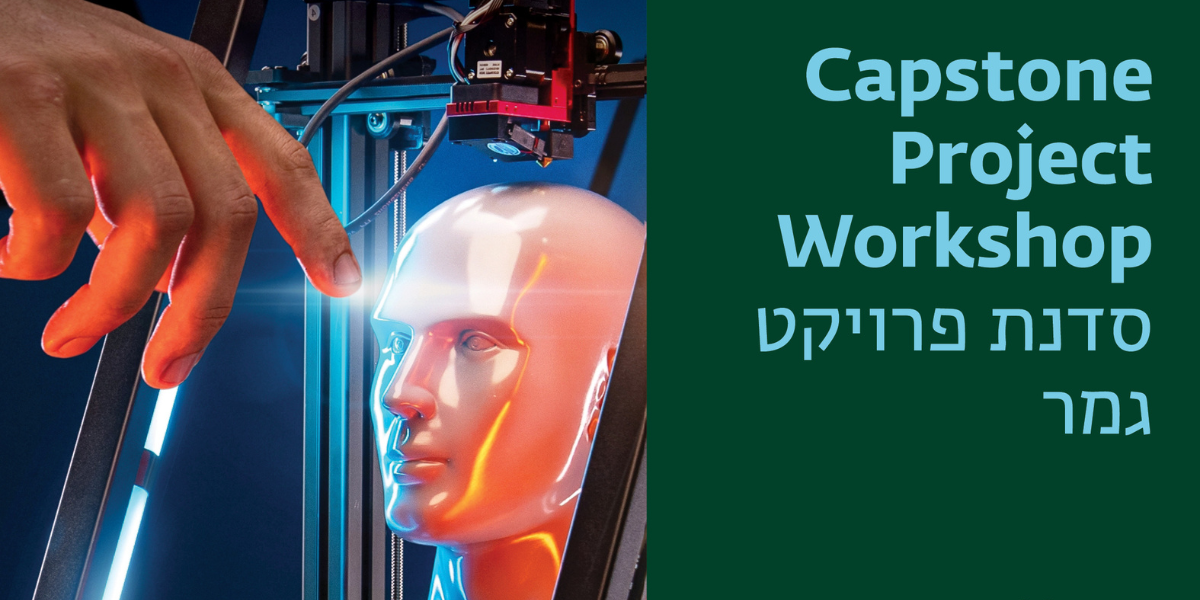Capstone project workshop / סדנת פרויקט גמר

ד״ר אלה קליק וד״ר דניסה רשף-קרה
ימי ג׳, 18:00-20:00 (שנתי)
Learning objectives
Synthesize theoretical knowledge and methodological training from the first year into an original, practice-based project.
Critically engage with emerging technologies and the digital turn through creative research and multimodal inquiry.
Experiment with diverse research formats, including speculative design, video essays, podcasts, policy papers, and interactive media.
Develop hands-on experience in applying innovative methodologies that challenge conventional academic formats.
Collaborate and provide peer feedback to refine projects through iterative design and conceptual development.
Knowledge
Develop a strong foundation in the key ethical, regulatory, and philosophical challenges associated with emerging technologies.
Describe critical ethical, legal, and regulatory challenges associated with emerging technologies such as AI, biotechnology, blockchain, quantum computing, and neurotechnology.
Define core concepts, including algorithmic governance, digital rights, data sovereignty, techno-ethics, and regulatory frameworks.
Summarize principles concerning emergent technologies, including AI ethics, data privacy laws, and responsible innovation policies.
Identify ethical dilemmas in the development, deployment, and societal impact of new technologies.
Compare philosophical, legal, and policy perspectives on the governance of emerging technologies, highlighting their strengths and limitations.
Skills
Analyze real-world case studies addressing ethical, legal, and societal challenges in emergent technologies, such as bias in AI, privacy risks in genetic data, and ethical concerns in decentralized finance (DeFi).
Evaluate existing regulatory and ethical frameworks and propose improvements for more responsible technological development.
Design speculative futures that explore alternative governance models and ethical frameworks for emerging technologies.
Develop a research-based project addressing an ethical, legal, or regulatory issue using appropriate methodologies and interdisciplinary approaches.
Critique the governance, transparency, and accountability of decision-making systems in technological infrastructures.
Write policy recommendations, ethical analyses, or regulatory proposals supported by empirical evidence and case studies.
Communicate complex ethical and regulatory issues effectively using diverse formats, including infographics, articles, presentations, and videos.
Present research findings and project outcomes persuasively in an interdisciplinary setting, integrating both theoretical insights and practical applications.
Course Abstract
This course serves as the culminating experience for students enrolled in the "Critical Thought and Emerging Technologies" MA concentration. The course asks students to synthesize the theoretical knowledge and methodological training acquired during the first year into an original, practice-based series of projects throughout the second year of the MA. Students will develop and execute creative research projects that critically engage with a topic of their choice relating to emerging technologies and the digital turn. Emphasis will be placed on innovative methodologies that challenge conventional academic formats, integrating speculative, artistic, and interventionist approaches to scholarship in the humanities. This capstone course, therefore, provides students with the opportunity to develop theoretically sound arguments through hands-on experience, preparing them for diverse endeavors in academia, media production, policy, design, and the creative industries. By engaging with multiple formats, students will experiment with different ways of producing and communicating knowledge in their respective fields (STS and Hermeneutics & Culture).
The course is structured around a series of thematic modules, each introducing a different research format or output.
Each module unfolds over several weeks:
First, an introduction to a format: A dedicated week exploring the format's affordances, examples, and methodological implications.
Second, brainstorming & work sessions: Guided discussions and workshops where students generate ideas and begin experimenting with the format. Through workshops, peer feedback, and mentorship, students will refine their project ideas, articulate research questions, and experiment with media-making techniques.
Third, group presentations & discussion: Students present their work-in-progress for peer and instructor feedback before moving on to the next module.
לסילבוס המלא
ביבליוגרפיה:
Floridi, L. (2019). Ethics of AI and Robotics. Nature Machine Intelligence.
Latour, B. (2005). Reassembling the Social: An Introduction to Actor-Network-Theory.
Ziewitz, M. (2016). Governing Algorithms: Myth, Mess, and Methods.
Buolamwini, J., & Gebru, T. (2018). Gender Shades: Intersectional Accuracy Disparities in AI.
Dunne, A. & Raby, F. (2013). Speculative Everything: Design, Fiction, and Social Dreaming.
United Nations. (2021). The Right to Privacy in the Digital Age.
Bridle, J. (2018). New Dark Age: Technology and the End of the Future.
Couldry, N., & Mejias, U. (2019). The Costs of Connection: How Data is Colonizing Human Life.
Jasanoff, S. (2016). The Ethics of Invention: Technology and the Human Future.
Eubanks, V. (2018). Automating Inequality: How High-Tech Tools Profile, Police, and Punish the Poor.
Bostrom, N. (2014). Superintelligence: Paths, Dangers, Strategies.
De Filippi, P. & Wright, A. (2018). Blockchain and the Law: The Rule of Code.



